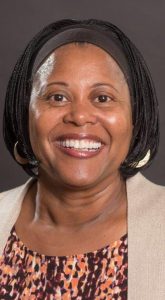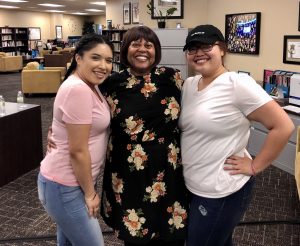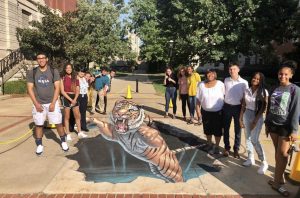Published on Aug. 18, 2020
Wise. Kind. Inspiring.
These are words students use to describe Karen Hayes, a student service coordinator at the Center for Academic Success & Excellence (CASE).
The Kansas City, Kansas native has worked at MU for more than 20 years in various positions including academic advisor for the School of Health Professions, recruitment and retention specialist for the College of Education, and she’s even taught a few classes on campus. Hayes is also the founder of the Dorsey Leadership Academy, a program designed to support underrepresented students in the College of Education. Her passion for bringing opportunities to marginalized students was the driving force behind her decision to join the staff at CASE.

Karen Hayes is a
student service
coordinator for the
Center for Academic
Success & Excellence
“I wanted to work with underserved and underrepresented students directly, not just have a few sprinkled on my case load,” Hayes said.
Now as a student service coordinator specializing in health sciences and the cohort leader of Brooks and Suggs scholars, Hayes continues to guide students towards success.
On a daily basis, Hayes advises students from all over campus, whether they are CASE scholars or not. No student gets turned away. From academics to emotional support, Hayes is always willing to lend a helping hand or listening ear. However, advising is a bit more intricate than many may perceive.
“Advising involves intervention and prevention,” Hayes said. “What I do is about 80% prevention. So, that’s about teaching students how to use their resources, what their responsibilities are, how to interact with others, and to really look at the choices they’re making.”
What Hayes does as an advisor goes hand-in-hand with what CASE is all about. The mission of CASE is to support the underserved and underrepresented minority students at Mizzou and Hayes’ advising style reflects that.
“Sometimes, students get into this mindset, especially Black students who grew up in more [not totally] urban areas, they have been so used to doing everything on their own, that they don’t know when they need help from an adult who cares about them,” Hayes said. “So, it’s that education. It’s telling them what’s here at Mizzou for them, getting them to plan for their futures.”
Aside from general one-on-one advising, Hayes also holds weekly meetings for the cohorts she leads. In these meetings, Hayes covers a variety of topics to help her students become more well-rounded professionally and academically, while keeping in line with CASE’s pillars for success.
“[In the cohorts], we are one trying to build a community of like-minded students who come from different places and in that, we are getting them ready for financial literacy, career development, wellness, a sense of belonging, and academic enrichment,” Hayes explained. “They’re already high-achieving students but sometimes they’re just so focused on keeping As and Bs that they don’t realize what else the university has to offer. So, we have to get them in. Because part of the way you belong is getting involved and taking leadership roles. You don’t stay in the margins; you start showing up and showing people ‘this is my campus.’”

Karen Hayes poses for a picture with two
KC Scholars.
A student Hayes has helped break through the margins is Juan Valencia, a sophomore majoring in Chemistry. Valencia, a first-generation college student felt lost during his transition to college, but credits Hayes for providing the necessary guidance to overcome the obstacles in his way.
“Every week, I have an appointment with Ms. Karen and every week that I go, it’s really helping me to move forward with my college life because it gets tough,” Valencia said. “Because I’m a first-generation college student, I don’t always know where to go. But not only does she provide moral support, she gives you the right resources. Now, I feel fulfilled with the performance I’ve done so far, and she was able to help me with that.”
Hayes’ ability to show compassion and understand her students, has been essential in forging relationships with them.
“I couldn’t have asked for a better person to mentor me, to guide me through college,” Valencia said. “She understands everything that I go through and she’s there, she listens. She’s not only doing her job, but she goes above and beyond, making sure she’s making this connection with me and all her students that she sees on a daily basis. So, I’m very thankful for her.”
Another student Hayes has positively impacted through weekly meetings is Kiara Delgado, a sophomore majoring in Biology.
“As soon as we started talking, she made me feel so comfortable. I would say that Karen definitely helped me find a familiar face super early on campus,” Delgado said. “She helped me feel like I already had someone to go to if I was stressed or needed literally anything at all even outside of academics. She’s also helped me keep myself accountable early on and she was someone that I kept my head on straight for because you just want to make her proud.”
Valencia and Delgado are just two of the many students who will rave about the impact Hayes has had on their college experience. So it’s no surprise her dedication to the well-being and success of students earned Hayes Mizzou’s inaugural Inclusive Excellence Award along with the School of Health Professions’ long-standing Inclusive Excellence Award in 2018.

Karen Hayes with the 2019 Brooks and
Suggs scholars
“All students who I work with always have a caring adult at Mizzou in good, bad, or indifferent times, Hayes said. “I like to remind students to remember what they want people to say about them when they are not in room because they have the power to demonstrate excellence.”
Hayes is hopeful that excellence will continue despite the unprecedented times we are facing. This fall, due to the COVID-19 pandemic, most of campus will look and function a lot differently, including cohort meetings and one-on-one’s with CASE scholars. However, this will not stop Hayes. She’s determined to make the necessary adjustments.
“It’s going to be difficult because the new cohort will not have that opportunity to come together in the same way, so I had to rethink how I’m going to do it. Drop-in times will be revised but students will always be able to meet with me individually,” Hayes explained. “I’m really looking forward to seeing the plans and mechanisms that students are putting into place. A lot of them have great goals. They want to go to graduate school, they want to get a job, they want to see what else is out there and I don’t think they’ll let this pandemic stop them.”